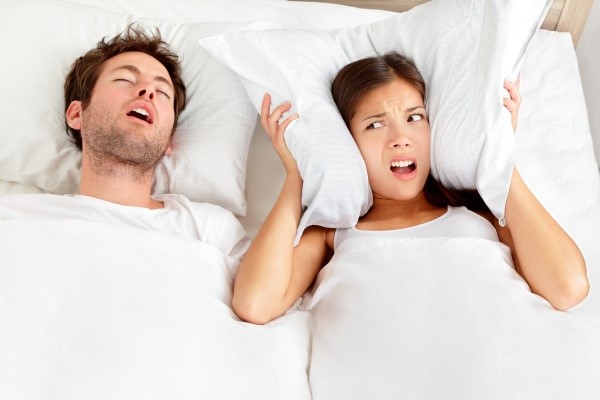How a Dentist Can Help With Mild Sleep Apnea

Sleep apnea can be an insidious condition. Due to the fact that it happens when a patient is unconscious, those who are affected by it likely do not know when episodes occur or how much the condition affects daily life. Sleep apnea can lead to loud snoring, daytime tiredness, trouble concentrating, and a feeling of not being refreshed upon waking.
How can sleep apnea affect a patient's life?
Partners of patients with sleep apnea might notice two telltale symptoms of the condition: loud snoring and periods during which the patient stops breathing during sleep. Most patients who can be helped by a dentist will have obstructive sleep apnea, which involves the patient’s throat muscles relaxing and blocking airflow.
Common symptoms of sleep apnea
When muscle relaxation occurs during obstructive sleep apnea, the patient might sputter, gasp for breath, snore, or wake suddenly. Their partner's sleep might be disturbed, as well. Multiple episodes over the course of the night can cause frequent waking and lead to poor quality sleep. Central sleep apnea presents with similar symptoms, but it develops from the brain’s inability to correctly signal the muscles that control the patient’s breathing.
Reasons to seek help from a dentist
Sleep apnea can increase preventable health problems by decreasing patients’ quality of sleep. Those who suffer from the condition are at higher risk for diabetes and heart disease. Because of sleep’s protective effect on mood, those who have sleep apnea are more likely to develop or have a relapse of a mood disorder, such as depression or bipolar disorder.
How can a dentist help treat sleep apnea?
Sleep apnea can be a potentially serious disease. There are several ways in which a dentist can help treat sleep apnea, including oral appliance therapy. For a milder case of sleep apnea, a dentist might provide a patient with one of the following devices.
Mandibular advancement devices
These are the most common devices used for treating mild sleep apnea. These devices look like mouthguards, so they may be comfortable and familiar for patients who have previously worn retainers or other nightguard-type devices. Mandibular advancement appliances push the lower jaw forward to tighten the muscles that usually relax during an episode of apnea. This new position will help the patient breathe normally at nighttime.
Tongue-retaining devices
These devices are not as common as mandibular devices. Mandibular devices tend to work well for patients who comply with treatment and present with uncomplicated cases of sleep apnea. Tongue-retaining appliances hold the tongue forward to keep the patient’s airway open. This prevents a position that would lead to apnea, and the new tongue position holds the lower jaw forward to retain beneficial muscle tension in the throat, as well.
Conclusion
Although severe cases of sleep apnea may need further evaluation by medical professionals, milder cases can be successfully treated by a dentist. If you have further questions, get in touch today to see what a dentist can do to enhance your quality of life by treating sleep apnea as soon as possible.
Request an appointment here: https://smilefreshdentalgrandblanc.com or call Smile Fresh Dental at (810) 515-7083 for an appointment in our Grand Blanc office.
Check out what others are saying about our services on Google: Read our Yelp reviews.
Related Posts
Dental professionals use a root canal treatment to stop tooth decay from getting worse and treat the effects of tooth decay. While reversing tooth decay is not possible, root canal treatment can often restore the appearance, shape, and overall health of a tooth that is damaged by a severe cavity.While minor cavities may only need…
Root canal treatment is often the best (or only) way to deal with an abscessed tooth that results from a tooth infection. This review discusses the role root canal treatment plays in treating an abscessed tooth and what you can expect throughout the diagnostic and treatment processes.An abscessed tooth can affect one’s ability to function…
Root canal treatment is often the last course of action to save teeth that have been severely damaged or infected. A tooth might become damaged due to trauma to the face or tooth decay destroying its structures.The procedure has a bad reputation as one of the most painful treatments performed by dentists, but patients usually…
Root canal treatment is a common dental procedure performed to save a damaged, decayed, or infected tooth from becoming lost or causing more concerning symptoms. It is important to understand the causes and warning signs that indicate a possible need for a root canal.The most notable and common causes for root canal treatment are an…
